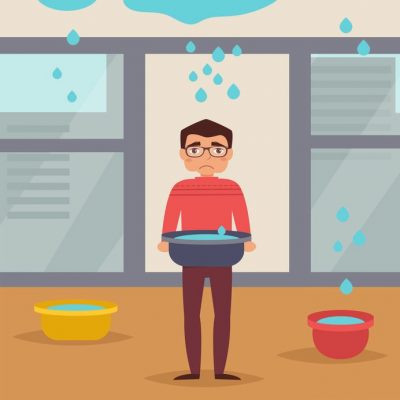Who is Responsible for Water Damage and Will the Association’s Water Insurance Policy Cover It?
 The Georgia Condominium Act, O.C.G.A. § 44-3-70, et. seq. (the “Act”), requires condominium associations to maintain property insurance policies for fire and extended coverage in an amount sufficient for full replacement costs of all buildings and structures within the condominium. This coverage applies to the buildings and structures themselves, which includes the common elements, limited common elements, and units. The Act, however, does not require condominium associations to carry water insurance, but many obtain this extra coverage due to the frequency of water losses in condominiums.
The Georgia Condominium Act, O.C.G.A. § 44-3-70, et. seq. (the “Act”), requires condominium associations to maintain property insurance policies for fire and extended coverage in an amount sufficient for full replacement costs of all buildings and structures within the condominium. This coverage applies to the buildings and structures themselves, which includes the common elements, limited common elements, and units. The Act, however, does not require condominium associations to carry water insurance, but many obtain this extra coverage due to the frequency of water losses in condominiums.
Coverage under a condominium association’s policy may be available for water damage in the condominium if (1) the total amount of damages exceeds the policy’s deductible and (2) the cause of the damage is covered under the policy. This applies regardless of whether the damage stemmed from the common elements or within an individual unit. But keep in mind, if a water pipe causes the damage, the repairs to the pipe itself will typically not be covered under the policy and any such repairs will be the responsibility of the association or unit owner, depending on who is responsible for the pipe’s maintenance under the governing documents. Boards and property managers should contact the association’s attorney to confirm who is responsible for maintaining the area at issue.
If there is no insurance available for the damage, either because the damage is not covered, or the amount of damage falls beneath the deductible (and assuming there is no act of negligence involved), then the person who is otherwise responsible for the portion of the condominium that is damaged is responsible for repairing the damage. For example, if there is a pipe burst that causes damage to both the common element hallway and to a unit, but there is no insurance available to cover the damage, then the owner is responsible for repairing the damage to the unit and the association repairs the common element hallway. On the other hand, if insurance coverage is available, the association’s insurance will typically cover the costs of any damages to the unit less the applicable deductible. Please note, however, the association’s insurance will only cover the costs to restore the unit as it was originally built-it will not cover any betterments or improvements, or any of the owner’s personal belongings.
Lastly, the owner will, in most cases, be responsible for covering any damages to the unit that falls beneath the applicable deductible. This is also a contributing reason why many declarations require condominium unit owners to carry their own insurance policy – an HO6 policy – covering their unit.
Is the Association Responsible for Water Damage in a Unit?
It is a common misconception that a condominium association is automatically responsible for damage to an owner’s unit when the damage stems from a common element condition (e.g., a common pipe burst, roof leak, etc.). But in fact, the association is only responsible for damage inside an owner’s unit if it was negligent in performing its maintenance responsibilities.
An owner’s mere claim that the association was negligent will likely not be enough to sustain a cause of action for negligence against the association. Negligence is defined by law and it will usually only be found if the owner can show that the association breached its duty to maintain the common elements and the owner experienced damages to their unit as a result of the breach. In other words, a court could find that the association was negligent if the association knew that a common element condition existed but waited an unreasonably long period of time to address the condition or took no action to address the condition. In the case of a random, unforeseen pipe burst, an association is less likely to be found negligent than in a situation where the condominium roof has been leaking for months and the association took no action to correct the leak.
What’s the Takeaway?
Ultimately, the association’s insurance policies and governing documents will determine how the association can proceed to address water damage in a condominium setting. Because these documents can be difficult to analyze, boards and property managers should contact the association’s attorney to confirm who is responsible for maintaining the area(s) at issue.
